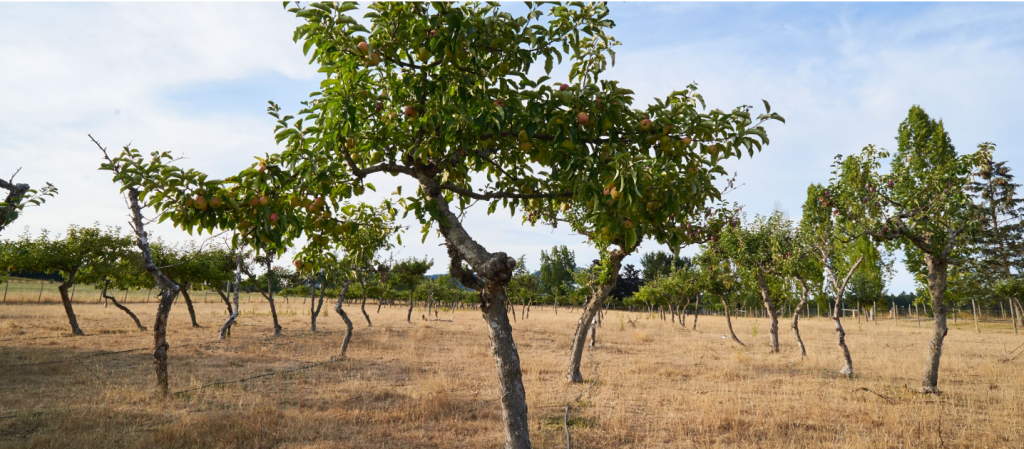
News
Environment
New plan helps Vancouver Island farmers adapt to climate change
July 17, 2020 By Fruit and Vegetable
 Farmers on Vancouver Island and the Southern Gulf Islands will have more support to adapt to climate change. Photo by Emrys Damon Miller, from the BC Agriculture & Climate Change Regional Adaptation Strategies Series.
Farmers on Vancouver Island and the Southern Gulf Islands will have more support to adapt to climate change. Photo by Emrys Damon Miller, from the BC Agriculture & Climate Change Regional Adaptation Strategies Series. Farmers on Vancouver Island and the Southern Gulf Islands will have more support to adapt to climate change following the development of the Vancouver Island Adaptation Strategies plan.
The plan identifies 11 strategies for increasing the resilience of producers in the region. The governments of Canada and B.C. will provide $300,000 in funding through the Canadian Agricultural Partnership to support projects that achieve those strategies. The projects will help farmers respond to four priority impact areas affecting the islands:
- warmer and drier summer conditions;
- changing pests and beneficial insects;
- increasing variability and shifting suitability; and
- increasing precipitation and extreme precipitation events.
“Our farmers are on the front line of climate change, and we should all be very proud of the hard work they are undertaking to adapt to changes in conditions,” said Marie-Claude Bibeau, federal minister of agriculture and agri-food. “By taking a region-specific approach, we are in the best position to support them with solutions customized to the unique challenges they face. At the end of the day, this is all about keeping our farmers’ operations strong and putting more locally grown food on our kitchen tables.”
“Farmers on Vancouver Island have long known that water availability is a critical factor for their production. Being part of the planning process was helpful for understanding the impact that climate change will have on water resources. This information is vitally important to support our current production systems as well as the future of the agriculture sector in our region,” said Arzeena Hamir, owner of Amara Farm and vice-chair of the Comox Valley Regional District board of directors.
“Farmers on Vancouver Island have long known that water availability is a critical factor for their production. Being part of the planning process was helpful for understanding the impact that climate change will have on water resources.”
The Vancouver Island adaptation strategies planning process, managed by the BC Agriculture & Food Climate Action Initiative (CAI), began in summer 2019. Through a series of focus groups, the process brought together 90 farmers to work with six Vancouver Island regional districts, as well as provincial and federal agencies, to identify priorities and actions for agricultural adaptation. The plan builds on the work of a 2013 pilot project, the Cowichan Adaptation Strategies plan.
“B.C. farmers are resilient by nature and experience challenges daily on their farms,” said Lana Popham, B.C.’s minister of agriculture. “We’re helping farmers plan and develop to respond to the challenges of a changing climate and how that affects their livelihood. These strategies, specifically designed for farmers on Vancouver Island and the Southern Gulf Islands, will help them adapt so they can continue contributing to our economy and providing the fresh local food our communities depend on.”
“I feel appreciative to have been part of the BC Agriculture & Food Climate Action Initiative workshops this past winter. I look forward to the B.C. government continuing to consult with non-stereotypical farmers and listening to the voices of female farmers, organic growers, Indigenous food producers, farmers on leased land and young or new farmers to help solve problems that affects us all: climate change, food security and access to good food,” said Katie Underwood, owner of Peas n’ Carrots farm.
A working group with up to 20 representatives from the agricultural sector and regional and provincial governments will oversee the development of priority projects. CAI will manage project implementation.
CAI develops tools and resources that increase the capacity of agriculture to adapt to climate change. Funding is provided by the governments of Canada and British Columbia under the Canadian Agricultural Partnership, a federal-provincial-territorial initiative, and is administered by the Investment Agriculture Foundation of BC and the BC Agricultural Research & Development Corporation. In B.C., action on climate change is a shared priority between the B.C. government, the BC Green Party caucus and Andrew Weaver, MLA for Oak Bay-Gordon Head, and is part of the Confidence and Supply Agreement.
In 2016, the total amount of land farmed on Vancouver Island was over 50,000 hectares. The region employed over 7,500 people in the agricultural sector (both farm operators and employees) in 2016.
Print this page